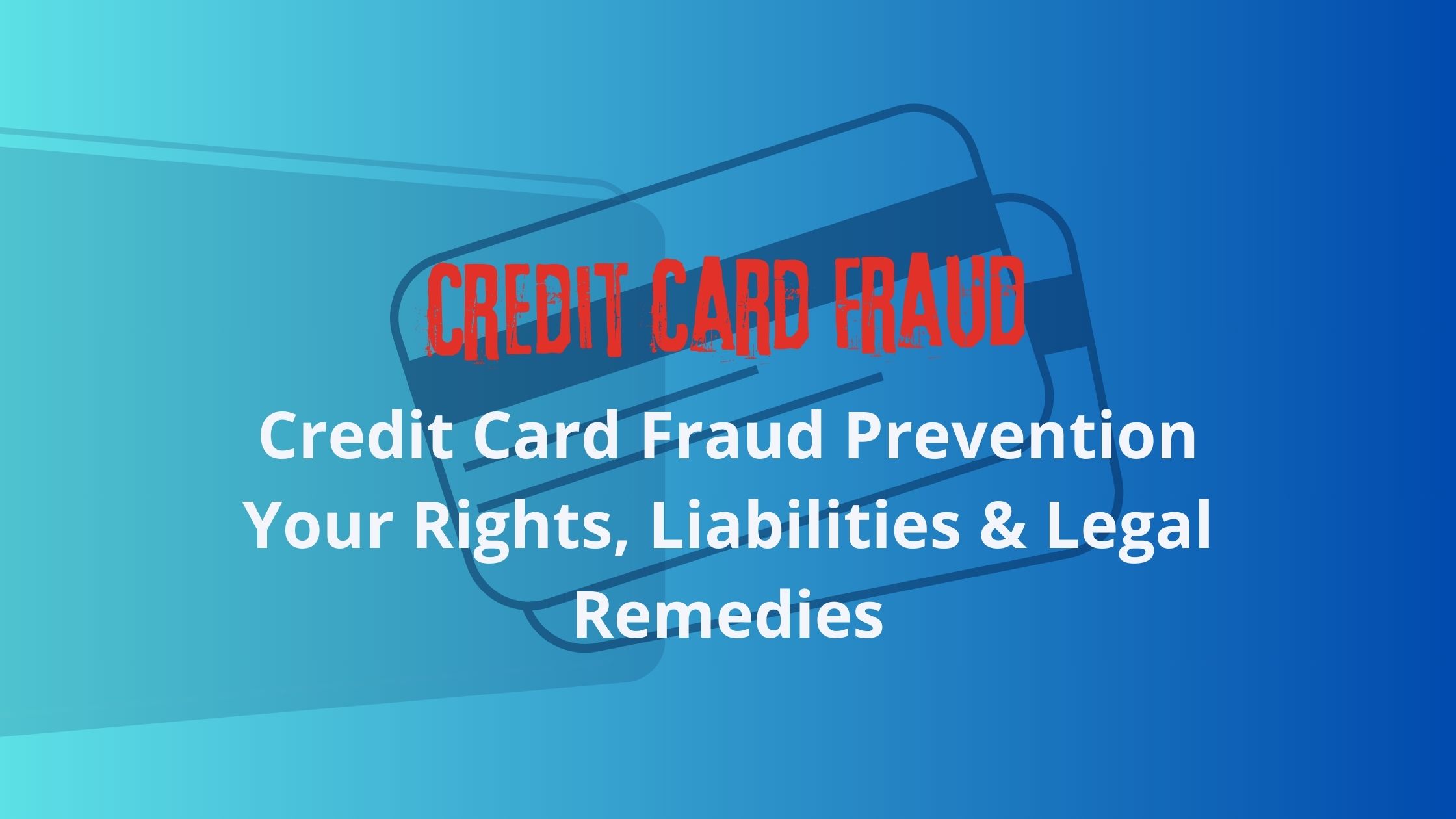Know Your Rights: Legal Protection Against Unauthorized Credit Card Transactions
In today's digital world, credit cards have made transactions seamless and convenient. However, they also come with the risk of fraud, identity theft, and unauthorized transactions. With cybercriminals constantly evolving their tactics, it’s crucial to understand how you can protect yourself and what legal rights you have if you become a victim of credit card fraud.
Common Types of Credit Card Fraud
Before diving into your rights and legal remedies, let’s first look at some common types of credit card fraud:
1. Phishing Scams
Fraudsters trick users into revealing card details by pretending to be legitimate banks or financial institutions through emails, phone calls, or fake websites.
2. Skimming
Scammers use hidden devices on ATMs or POS machines to steal credit card information.
3. Online Fraud
Hackers gain access to your credit card details through data breaches or unsecured websites, leading to unauthorized online transactions.
4. Identity Theft
Someone illegally uses your personal information to open credit accounts in your name.
5. Lost or Stolen Card Misuse
If your card gets lost or stolen, fraudsters can use it for unauthorized transactions before you block it.
Your Rights as a Credit Card User
To protect consumers from financial loss due to fraud, regulatory bodies like the Reserve Bank of India (RBI) have outlined strict guidelines. What you should know about your rights is as follows:
1. Right to Limited Liability in Fraudulent Transactions
- If an unauthorized transaction occurs due to negligence on the bank's part, the customer has zero liability and the full amount must be refunded.
- If the fraud occurs due to your negligence (e.g., sharing your OTP or PIN), you may have to bear some responsibility.
- If you report the fraud within three days, your liability is minimal. The longer you delay, the more liability you might bear.
2. Right to Dispute Unauthorized Transactions
- You have 60 days to dispute a fraudulent transaction.
- Banks must resolve your complaint within 90 days of filing.
- If the bank fails to act in time, it must compensate you for the loss.
3. Right to Protection from Unsolicited Credit Cards
- Banks cannot issue credit cards without your consent.
- If a bank issues an unsolicited card and charges you for it, you can file a complaint with the Banking Ombudsman and claim a full refund.
4. Right to Compensation for Financial Loss
- If you experience financial loss due to a bank’s negligence, you have the right to seek compensation through legal action or consumer courts.
Legal Remedies for Credit Card Fraud Victims
If you fall victim to credit card fraud, here’s how you can take legal action:
1. File a Complaint with the Bank
- Immediately report unauthorized transactions to your bank through customer service, email, or mobile banking.
- Most banks have a dedicated fraud protection team to assist customers.
2. Register a Complaint on the RBI Ombudsman Website
- If your bank does not resolve your issue within 30 days, escalate it to the RBI Banking Ombudsman.
- Visit https://cms.rbi.org.in/ to lodge a complaint.
3. Report to Cyber Crime Authorities
- If the fraud was committed online, file a complaint at the National Cyber Crime Reporting Portal: https://cybercrime.gov.in/.
- Provide evidence such as transaction details, emails, or SMS alerts related to the fraud.
4. Approach Consumer Forums for Compensation
- If you suffer financial loss, file a complaint under the Consumer Protection Act, 2019 in a consumer court.
- You can seek damages for financial loss and mental distress caused by the fraud.
5. Lodge a Police FIR
- For serious fraud cases, register a First Information Report (FIR) at your local police station.
- Mention all details of the fraud, including transaction history and communication with the bank.
How to Prevent Credit Card Fraud?
Despite the existence of legal remedies, prevention is always preferable to cure. Follow these best practices to protect your credit card:
- Enable Transaction Alerts – Activate SMS and email alerts to monitor every transaction.
- Use Strong Passwords – Keep your online banking passwords unique and secure.
- Avoid Public Wi-Fi – Never enter card details while connected to an unsecured network.
- Check Bank Statements Regularly – Identify suspicious transactions early.
- Never Share Your OTP/PIN – Even bank representatives won’t ask for it.
- Use Virtual Cards for Online Shopping – Generate temporary card details for secure transactions.
- Update Your Contact Details – Ensure your bank has your latest phone number and email.
Conclusion
Credit card fraud can be financially and emotionally distressing, but knowing your rights and legal remedies can help you act swiftly. Always stay vigilant, report suspicious activities immediately, and make use of legal channels to protect your finances. Remember, prevention and awareness are your strongest tools against fraudsters! Share your feedback on https://forms.gle/RMs3hVzHNBRPovLD7
